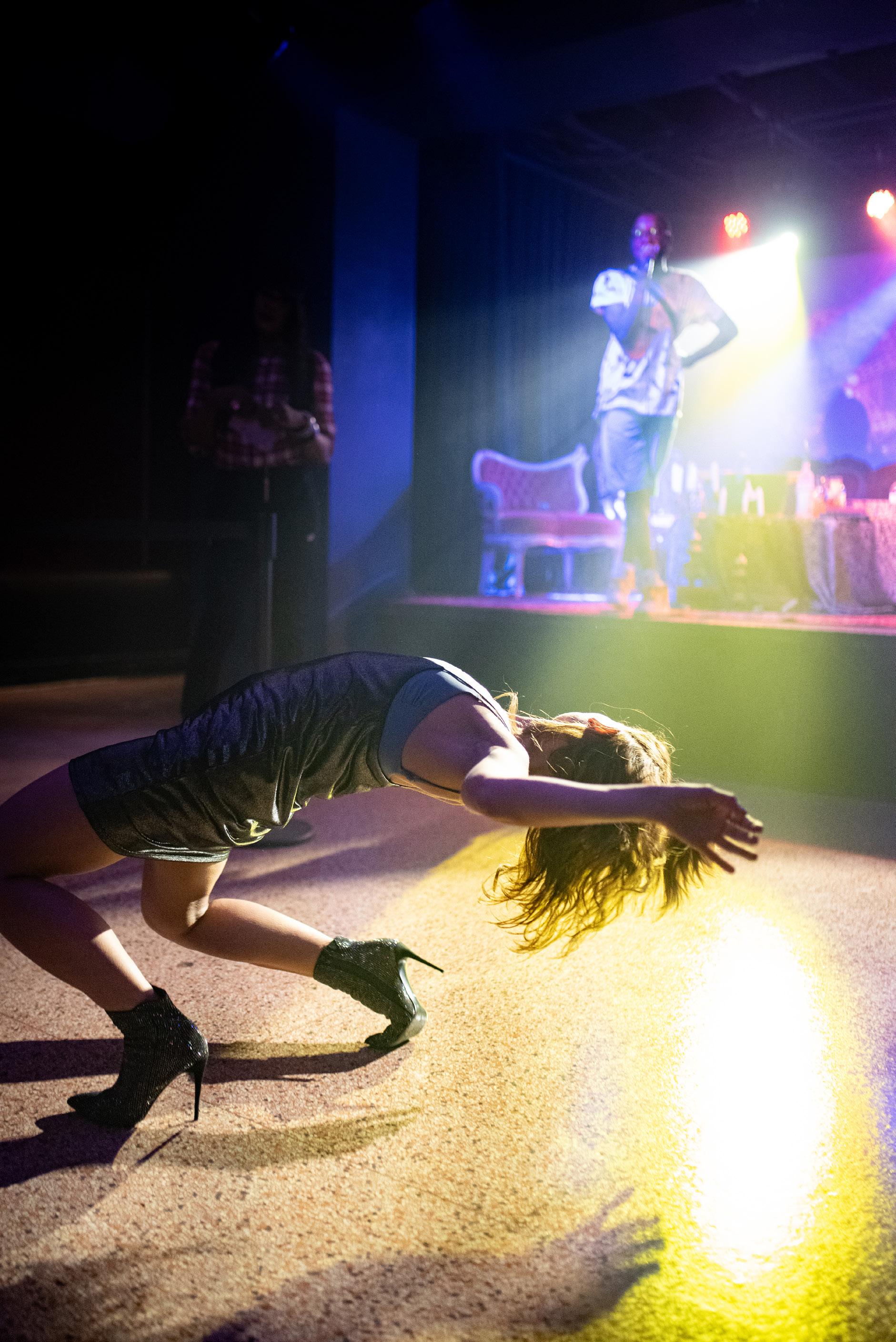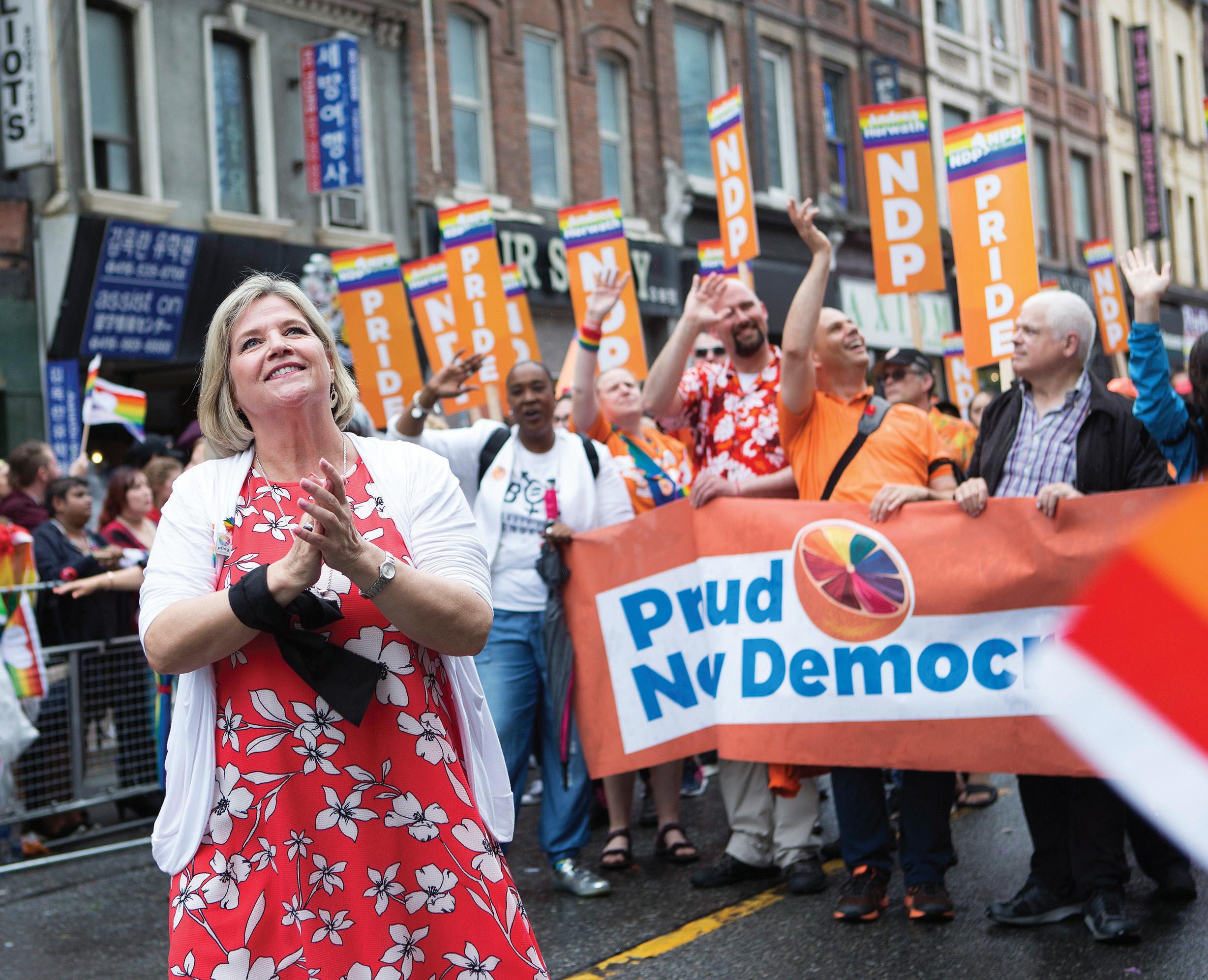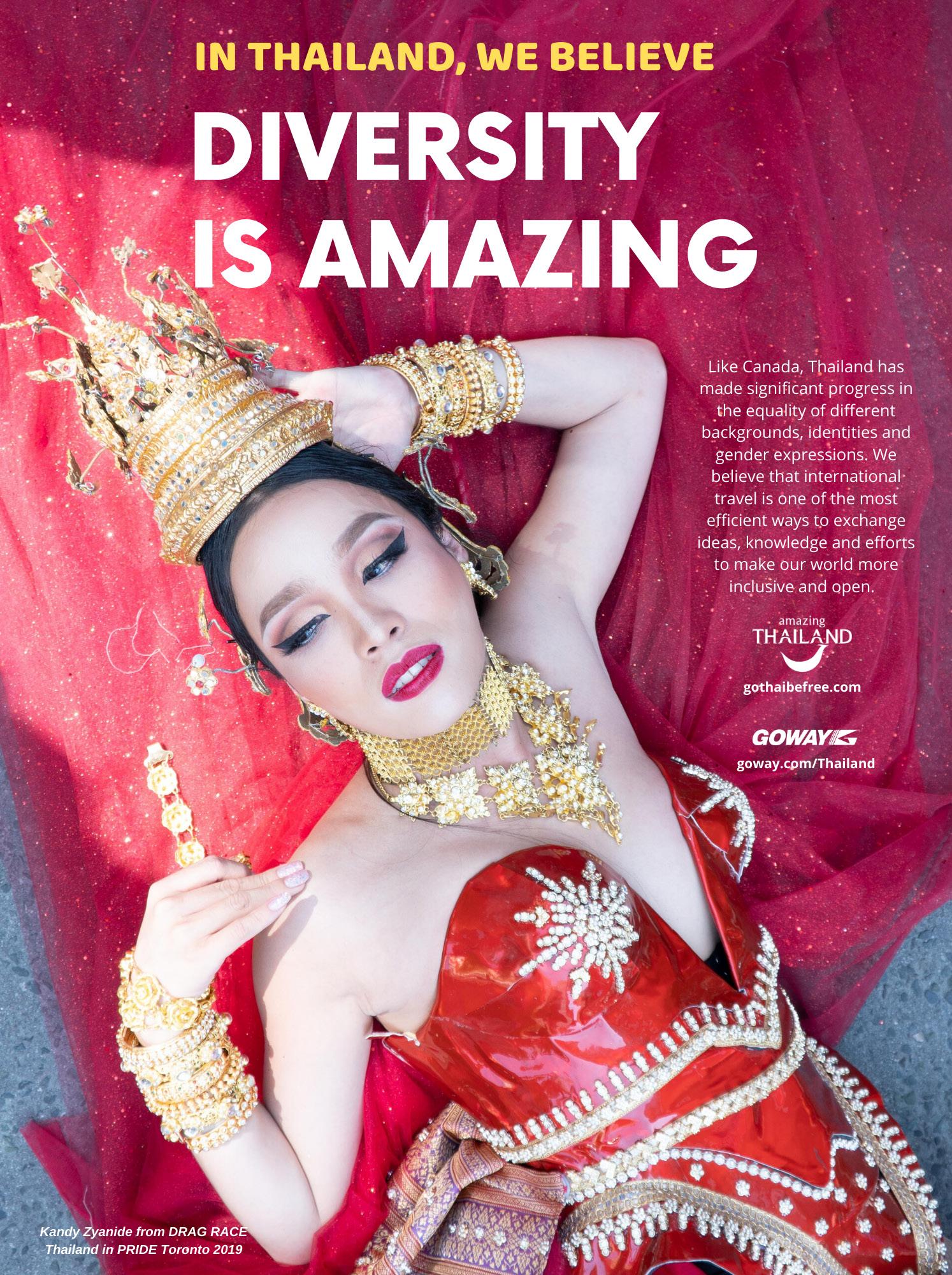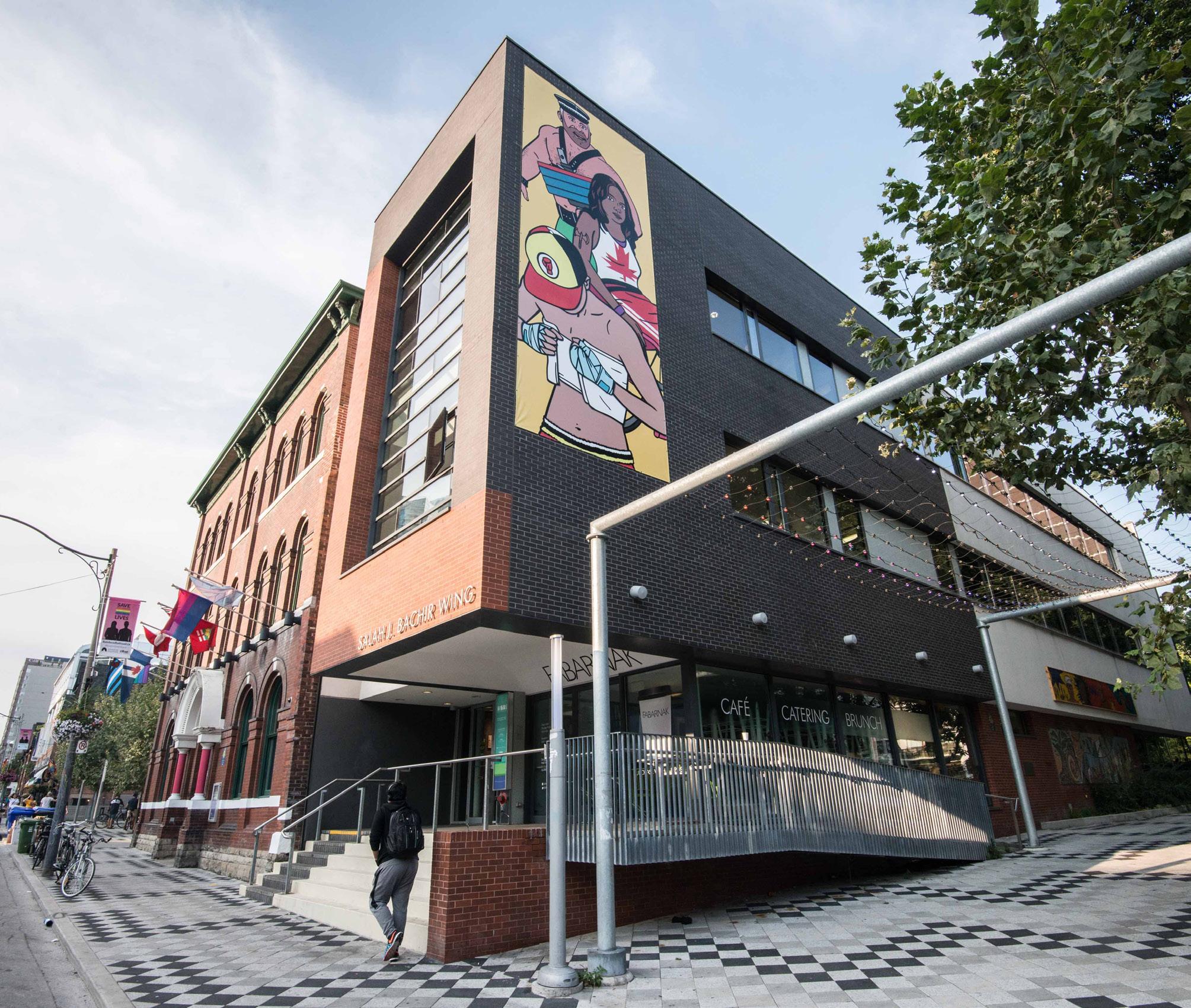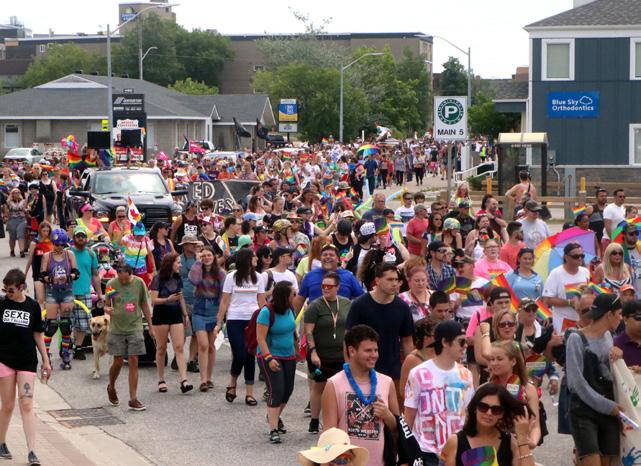
26 minute read
PRIDE VOICES
Pride parades and celebrations across the country are officially cancelled this year – but that doesn’t mean we can’t still come together. Pride Month is still happening, and you can watch for virtual celebrations of Pride throughout the rest of the summer.
We reached out to Pride organizations from coast to coast and asked them for their messages of support to the LGBTQ2S community, as a reminder that Pride is more than just a parade.
For The Love Of All Things Pride
A few good people have created a movement for change in North Bay
By Jason Maclennan
Humble beginnings, an idea, a concept, and a determination by a few good people turned into a movement for change and the betterment of all within the City of North Bay.
North Bay Pride has been able to influence change to the point where now a new city development includes gender-neutral washrooms. Local community leaders, including politicians, listen when North Bay Pride has something to say. This shows any Pride can promote change.
North Bay Pride started having organized Pride in 2017. The first major event, which included a march and free picnic, was put together in five weeks. More than 2,500 people marched through downtown North Bay demanding equality and acceptance. Over the next few years leading into 2019, the parade grew to more than 5,500 people, while other events over four days attracted more than about 7,000 people. Now this is talking numbers and influence! Many say that’s nothing – but let’s remember, Sparky, we’re talking about a city of 52,000 people. North Bay Pride has learned the art of collaboration, and it shows.
Henri Giroux and Amanda Farrow-Giroux, who are part of the North Bay Labour Council, came to the community asking why North Bay Pride had no organized Pride. Giroux describes those first few meetings. “Amanda and I were overwhelmed by the response from the 2SLGBTQ+ community when we offered to support a Pride within the community. We had some funds we could use, supplied by local unions. We offered anything to get this off the ground. And five weeks later, we walked with pride with the 2SLGBTQ+ community feeling like a difference was being made for the city of North Bay.”
North Bay Pride’s CEO Clifford Hummel describes his experience, which led him to join its board of directors. “I was not really out at public events such as Pride. I heard several rumours – which turned out not to be true – about the legitimacy of Pride in North Bay. I took my time, watched, and saw the success and the change that was happening in the city. I knew I just had to be part of this organization, which has grown beyond any expectations. I love it!”
Brandon Dadd, who has attended previous events, sums up what Pride can do and has done for him. “North Bay Pride is part of what really made me come out of my shell while I was able to accept and discover who I truly am.”
“North Bay Pride is a movement in our city that we all embrace,” says City of North Bay Mayor Al McDonald. “A city that can bring everyone together is an amazing feat. The journey of inclusion never ends, and North Bay Pride helps all of us focus. ”
Anthony Rota, Member of Parliament for Nipissing-Timiskaming, has this to say: “Perhaps even more important is the impact of North Bay Pride beyond these ‘official’ days of celebration. Pride promotes awareness – awareness of how far we have come, and that we have more work to do. Awareness that as Canadians, we can be who we are and love who we love, and that the Charter of Rights and Freedoms protects all of us 365 days a year.”
North Bay Pride is finding that balance of being grassroots on issues affecting the 2SLGBTQ+ communities, while celebrating the steps that have moved us forward. It is profoundly important to recognize, and not forget, the influence that Prides around Canada truly have when they all stand together. Prides provoked one of the biggest conversations in 2018 about HIV and the U=U message, which is a prime example of the power of Prides when they remember the basics of what they stand for.
People may constantly see one person up front, or in the news, or speaking in public, but it is always so important to remember they have a team to stand behind them. Prides are growing and learning while making a difference in the world.
As Olivia Nuamah, former executive director of Pride Toronto, said during an interview on Str8 Talk, “What is good for the queer community is good for everyone.” These are wise words to embrace and live by.
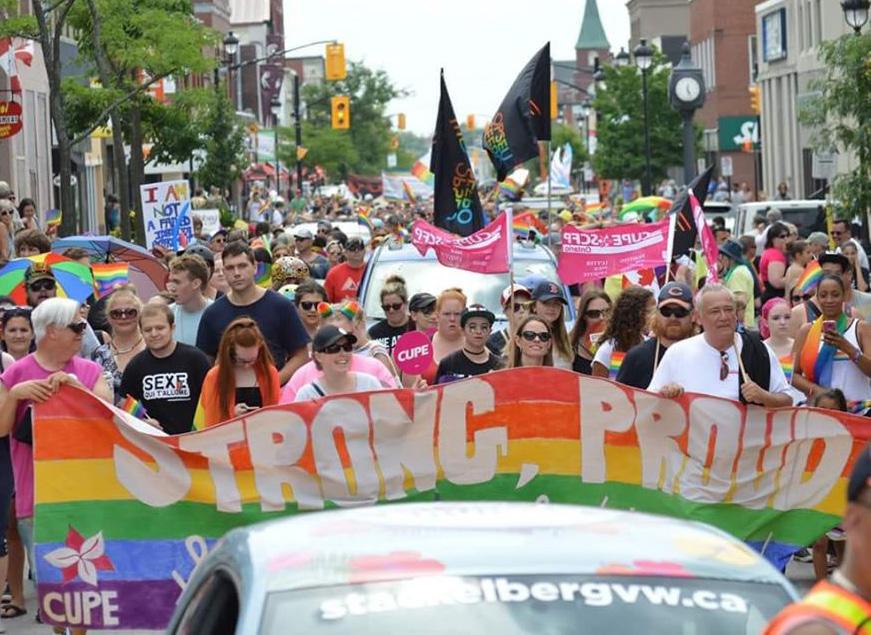
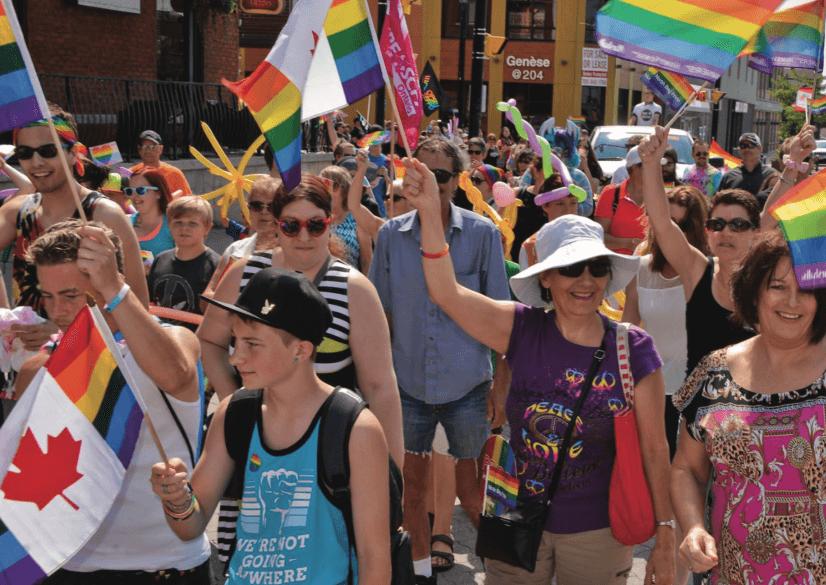
Turning The Boat Around
Vancouver Pride hears from the community on how to heal deep hurt
By Kaschelle Thiessen
In 1974, Pat penned an article in Pedestal, Canada’s first feminist periodical, explaining why she didn’t go to Vancouver’s Gay Pride Rally. “Even if we did end police harassment of homosexual bars and restaurants,” wrote Pat, “it would not end my harassment in such places.” She went on to write that she had more in common with straight women than with gay men, so she would continue to put her energy into the women’s movement rather than Gay Unity Week.
Six years later, writing in the Westender, Sandra expressed similar doubts about Gay Unity Week. “I myself am a transsexual,” explained Sandra. “I was confronted in a gay bar last year by the owner, who said I was a drag queen and no drag queens were allowed. I don’t promote myself as a drag queen and I sure don’t respect gay bar owners who tell me how to dress.” That was 1980, one year before Vancouver’s first-ever Gay Unity Parade, and the community already had doubts about the event that would one day become the Vancouver Pride Parade. “What is gay unity week,” asked Sandra, “if gays can’t unite with one another?” Reading through old periodicals is a trip: one moment you are proud of how far we have come, and the next you are surprised at how little has changed. Nearly 40 years later, the Vancouver Pride Parade has grown beyond its humble origins into one of the largest events in Western Canada. Yet fractures within our communities run deep, stretching back decades and widening year by year. Pride has long been accused of being divorced from its roots, becoming a party for affluent white gay men. With years of momentum fuelling both growth and division, how do you begin to heal those wounds? Andrea Arnot, executive director of the Vancouver Pride Society, thinks she might have some answers. “When I come into a new organization, I like to get a snapshot of the current landscape and figure out how to move forward,” explains Andrea. “Once I was in my new role for a few months, I recognized there were far more issues than I was originally aware of.” Andrea’s first instinct was to hold a series of community consultations to get the lay of the land. This process revealed a number of deeprooted issues that Andrea set out to address. Part of the process has been finding ways to decrease barriers while increasing inclusion at Vancouver Pride. This has ranged from partnering on Vancouver Pride’s first QTBIPIC-centric events, to engaging in an accessibility audit and disability justice training for all staff, to the creation of a 12-foot interactive kinetic peacock representing bisexual visibility.
Supporting the community has included giving funding to community organizers. “We recognize that Pride can’t be everything for everyone. Some folks will never come to our events regardless of what we do, and that’s okay,” says Andrea. “People are already doing meaningful and amazing work for their communities. Our role as an organization is to support that work...to provide whatever funding, resources, marketing and staff support is needed to help
them build their capacity.” Not all of Vancouver Pride’s recent changes have been popular, including the controversial decision to remove uniformed members of law enforcement from the Vancouver Pride Parade. This was followed by barring the University of British Columbia and the Vancouver Public Library from marching in the parade due to their decision to provide a platform for transphobic speakers. “While these decisions were contentious within our communities,” says Andrea, “Vancouver Pride chose to stand with those most oppressed within our communities, not just those with the loudest voices.”
It has taken several years, but members of the community who had previously disengaged with Vancouver Pride are starting to notice. “Folks are reaching out to us and letting us know they appreciate what we are doing,” says Andrea. “My biggest learning has been to listen and to really hear what people have to say, to hear the feelings behind what has happened in the past.”
Andrea feels Vancouver Pride has started to create the relationships necessary to move forward and is excited for what the future holds. “We need to take responsibility as an organization, offer apologies,
and try to find a way forward. Together.”
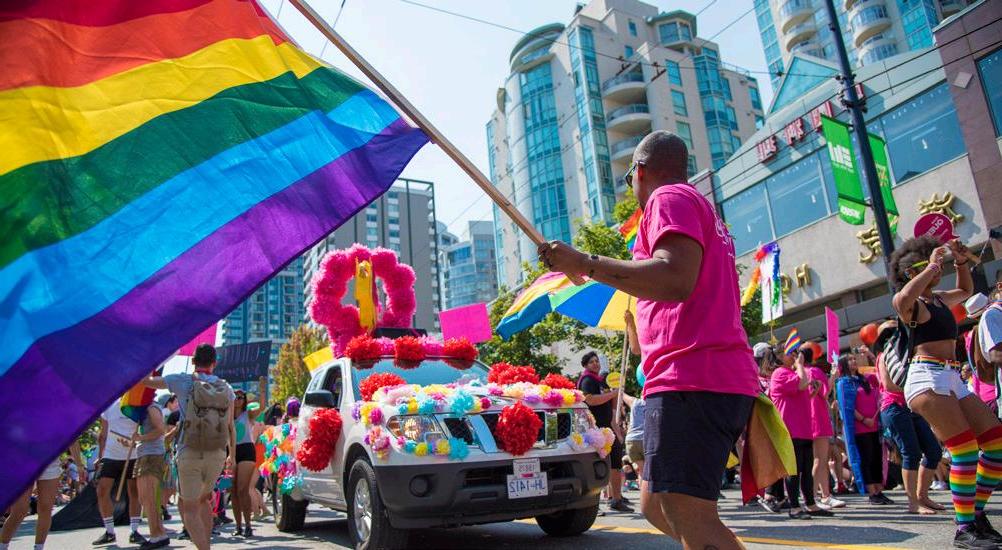
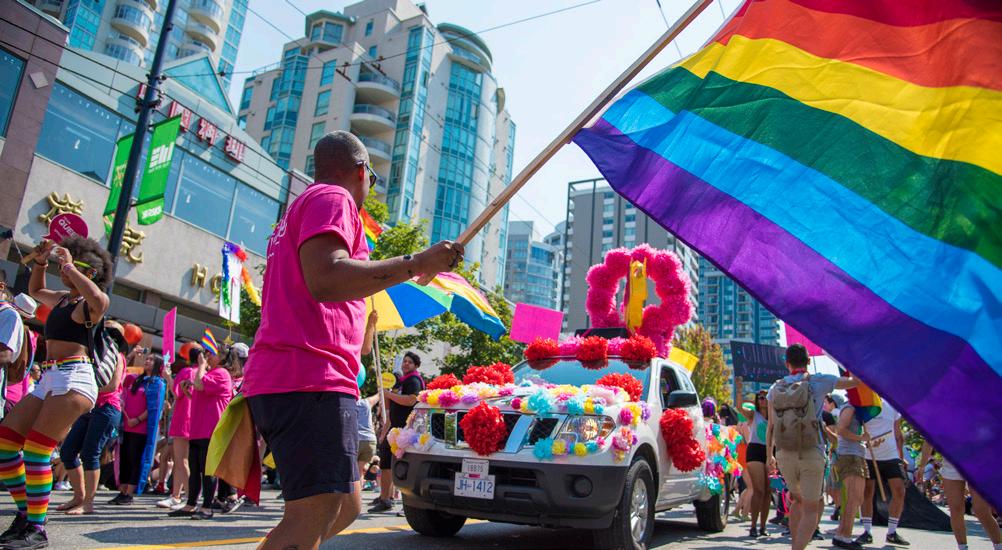
It Takes A Village To Save A Village
By Pride Toronto
To walk down the street and visit the restaurants and shops in the Church & Wellesley Village, for many of us, is akin to walking through the rooms and corridors of our own family home. The village is where our communities gather to share our experiences, our stories, our joys and our struggles. Our bars are steeped in history. Our stages are full of passion. The restaurants are our family dinner table. The shops carry and proliferate our culture. The spaces in between are where life’s small moments help connect us.
For 40 years, Pride Toronto has been honoured to call the village home. The Pride festival is, in some ways, our incredible annual house party, where we invite the world to experience the magic of this place and its people.
To help keep everyone safe during the COVID-19 global health crisis, we have moved to a virtual Pride experience. While we are excited about the new possibilities for expression and access that this approach will create, the impact on the village will be incredibly difficult. So many of our local businesses depend on Pride festival crowds to get them through the slower times of the year.
COVID-19 has brought with it a confluence of crises for LGBT2Q+ communities. Job losses, housing losses, fear, anxiety, and loss of support for vulnerable individuals are part of the current reality. The Canadian Civil Liberties Association reports that homophobic and transphobic attacks have increased dramatically. Egale Canada’s national study, The Impact of COVID-19 on the LGBTQI2S Community, reveals the depth of some of the challenges in startling statistics:
• 52% of Canada’s LGBT2Q+ households have faced layoffs or reduced employment as a result of the COVID-19 pandemic, as compared to 39% of overall Canadian households.
• 53% of the LGBT2Q+ community do not feel confident in their current household’s financial situation, as compared to 40% of non-LGBT2Q+ people.
The effects of the crisis on the cultural and economic fabric of the village are just as pronounced. The Church Wellesley BIA remains in close conversation and collaboration with our community of businesses, and the situation is dire. Rents in the village are higher than on Yonge Street, and so many local bars, restaurants and shops operate on razor-thin margins even in the best of times. The spectre of losing a large number of LGBT2Q+ businesses is real as the weeks roll by without income or strong government support. This is a reality we cannot let come to pass.
This is not a crisis that’s limited to the geographic boundaries of our neighbourhood. The village is a beacon and a promise for every LGBT2Q+ kid in the far reaches of Canada. It is the destination that global tourists give their cab driver when they land at Pearson. It is the centre of gravity for those who’ve moved away but still know they can always return. This home has space for all of us and it requires protecting.
Pride Toronto works closely with The Village BIA to create an incredible experience for the 1.7 million festival attendees. We are proud to be able to work with such resilient business owners who serve our community 365 days of the year and contribute to the history and survival of the village.
Pride Toronto has announced the launch of our online vendor portal: a curated list of local LGBTQ2S+ makers, creators and vendors that you have come to expect and are excited to see throughout our annual StreetFair. We have also introduced a number of Virtual Pride programming celebrating these makers, including a weekly unboxing of various items available in our online vendor market, hosted by Max Claude and Mango Sassi.
During this time of uncertainty, supporting LGBT2Q+ communities is more important than ever. In order to continue our support of LGBTQ2+ business owners and makers during this difficult time, Pride Toronto has launched a few exciting initiatives as part of the Virtual Pride programming. Though we are excited about these initiatives, we also know that it won’t be enough.
There are tangible and actionable steps that can be taken to save the businesses, culture and support systems within the village. It will take government financial aid, suspension of commercial evictions, community support and a long-term recovery support strategy, to name a few.
We are hopeful that work can be done to save Toronto’s village. Our communities will need to come together once again in solidarity to make this happen. As the Church Wellesley BIA said, “It takes a Village to save the Village.”
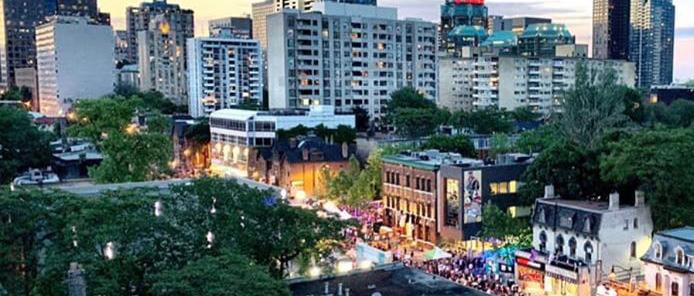

Celebrating la Francophonie
Montréal Pride plans to host an alternative Pride celebration aimed towards strengthening the global Francophone movement of the sexual and gender diversity communities
By Mathieu Audette
In these uncertain times when physical distancing is pervasive throughout the world, we direct our reflection towards the sexual and gender diversity communities that inhabit hostile territories where recognition is not fully achieved. Our highest priority has always been to reach the greatest number of people in our communities and to do that in both French and English, thanks to Montreal’s bilingual status and its location in Quebec. Our bilingual programming illustrates our strength in bringing together artists from here and abroad, and has enabled us to become the biggest Pride celebration of the Francophone world.
With a growing French-speaking population in Africa, we believe that our outreach to smaller organizations will bring renewed hope to countries where recognition of LGBTQ+ communities is not a human right. Part of our mission is reaching out to these countries through our trips to Cameroon, Kenya and the Congo; offering support and assistance to increase the visibility of LGBTQ+ people; and spreading love and acceptance of the Pride movement.
“In order to address these situations where improvement is crucial, we want to bring together Francophone Pride organizations from around the world and create a grouping that will allow us to interact and, most importantly, transfer knowledge to strengthen the global Francophone sexual and gender diversity movement,” explains Éric Pineault, founding president of Montréal Pride.
The current obstacles rekindle the need to come together as a community. More than ever, our adapted programming will pay tribute to Canada’s Francophonie by making it shine throughout the world. It is by overcoming these difficult times that we will be able to celebrate in the coming years a Francophone Pride by physically bringing together our communities from here and afar!
Be safe, be kind, and be proud!
Happy Pride, and we look forward to celebrating with you differently from Aug. 10 to 16, 2020. En cette période d’incertitude, où la distance physique est omniprésente dans le monde entier, nous orientons notre réflexion vers les communautés de la diversité sexuelle et de genre qui habitent des territoires hostiles à nos communautés et même d’ici, où la reconnaissance n’est pas pleinement atteinte. Notre plus grande priorité a toujours été de rejoindre le plus grand nombre de personnes de nos communautés en français et en anglais, grâce au statut bilingue de Montréal et à son emplacement au Québec. Notre programmation bilingue illustre notamment notre force à réunir des artistes d’ici et d’ailleurs et nous a permis de devenir la plus grande célébration de la Fierté de la francophonie.
Avec une population francophone croissante en Afrique, nous croyons que notre rayonnement auprès de plus petits organismes permettra un espoir renouvelé pour les pays où la reconnaissance des communautés LGBTQ+ ne figure pas parmi les droits de la personne. Tendre la main à ces pays via nos voyages au Cameroun, au Kenya et au Congo, en offrant un soutien et une aide pour accroître la visibilité des personnes LGBTQ+ et pour répandre l’amour et l’acceptation du mouvement de la Fierté, fait partie de notre mission. « Afin d’aborder ces situations où l’amélioration est cruciale, nous souhaitons rassembler les organisations francophones du mouvement de la Fierté dans le monde, et ainsi créer un regroupement nous permettant d’interagir et surtout, de procéder à un transfert de connaissances visant à renforcer le mouvement global francophone de la diversité sexuelle et de genre. » explique Éric Pineault, président fondateur de Fierté Montréal.
Les obstacles actuels ravivent la nécessité de se rassembler en tant que communauté. Plus que jamais, notre programmation adaptée à la situation rendra hommage à la francophonie au Canada en la faisant rayonner à travers le monde entier. C’est en surmontant ces moments difficiles que nous pourrons célébrer, dans les années à venir, une fierté francophone en rassemblant physiquement nos communautés d’ici et d’ailleurs!
Soyons solidaires, soyons bienveillant.e.s et soyons fier.e.s! Bonne Fierté à toustes et au plaisir de célébrer différemment avec vous du 10 au 16 août 2020.
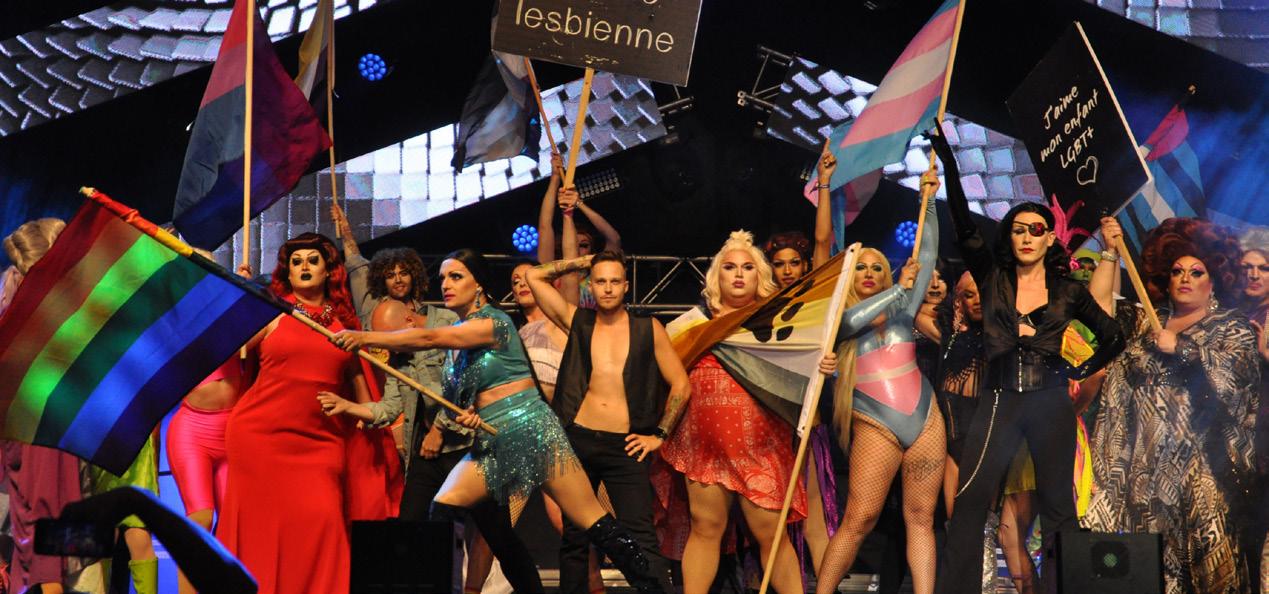
You Can’t Just Cancel Pride: It’s a Year-Round Passion
Calgary Pride celebrates its 30th anniversary this year, and more than 40 years of rich history in Calgary
By Elliot Rae Cormier
We’ve come a long way, baby! From the humble beginnings of a backyard barbecue, to a few dozen marchers along 17th Avenue wearing paper bags over their heads to protect their identities, to small marches in areas that would disrupt the least amount of traffic…and on to our current celebrations, with the 2019 Calgary Pride Parade & Festival attracting 100,000 spectators.
Project Pride Calgary, a grassroots collective of six like-minded gay and lesbian organizations, formed in 1987 and put on the city’s first small Gay and Lesbian Pride Festival in June 1988.* In 1990, Pride Week kicked off with a political rally where folks congregated downtown at the Old Y Centre, suiting up in Lone Ranger masks and paper bags to prevent themselves from being identified by unsupportive landlords and employers.
The mayor at the time, Al Duerr, took a political risk in 1991 by proclaiming the week of June 16 as Calgary’s first Gay Rights Week. Due to the conservative backlash that developed over his decision in the following weeks, he later renounced his decision, calling the support a mistake. The community declared their own Gay and Lesbian Rights Week the next year regardless, and pressed on without the support of the mayor’s office. After all, you can’t just cancel Pride.
Fast forward to 2011, when Mayor Naheed Nenshi became the first mayor to lead the Calgary Pride parade, perched on a red Mustang and donning his iconic royal purple “straight not narrow” T-shirt. He’s shown his support for Calgary’s gender and sexually diverse people and our initiatives ever since.
Recognizing Pride is ultimately an act of resiliency, community and love. Pride happens not just for a week or for a month, but all year round in our homes, in our hearts and out in our communities. And this year is already no different.
Over the past year, Calgary Pride, along with 22 other LGBTQ2S+ serving organizations and affirming faith groups, led the charge on bylaw legislation to ban the abusive practice of conversion therapy in Calgary. The LGBTQ2S+ community and our allies sent a strong message to the city: we are loved, we are valued, and we do not need to be changed. After two marathon days of live public engagement, the bylaw passed on May 25, 2020 in a 14:1 City Council vote.
Today, Calgary Pride is the fourth largest, and fastest growing, Pride Festival in Canada. We’ve nearly doubled in size over the past four years. Calgary Pride produces a whole host of year-round programming including Reading with Royalty (a gender-diverse drag storytime in partnership with the Calgary Public Library), Evolve: Pride Amplified (a fundraising gala for local LGBTQ2S+ youth programming), and Queerly Festive (a free holiday dinner and show to feed our found family’s bellies and hearts at a time when many of us feel isolated and alone).
We do this work with the support of our partners and with the dedication of a volunteer board of directors, eight year-round volunteer committees with over 60 members, hundreds of remarkable volunteers clocking thousands of hours, four summer contractors, two full-time staff and a seriously immeasurable amount of appreciation for our community.
Our past matters. The historic Old Y Centre from that game-changing 1990 political Pride rally is now known as CommunityWise Resource Centre. There, behind a rainbow door, is where the Calgary Pride office exists today.
Our future matters, too: this year’s shift to digital programming in light of the global pandemic offers us and all Pride organizations a unique opportunity to inspire more empathy, reach more vulnerable people and amplify more voices existing on the margins of our communities than ever before.
This year’s 30th Anniversary Calgary Pride Week, presented by ATB Financial, runs from Aug. 28 to Sept. 6, 2020. Calgary Pride is engaging with local businesses to support us in creating smaller, safer Pride events and initiatives, and we’re still recruiting Canadian artists and performers of all talents and mediums to strut their stuff online. Our team is happy to support artists through the technical side of the creation process however we can. Learn more and apply by June 30, 2020 at calgarypride.ca.
Together and apart, #WeAreCalgaryPride.
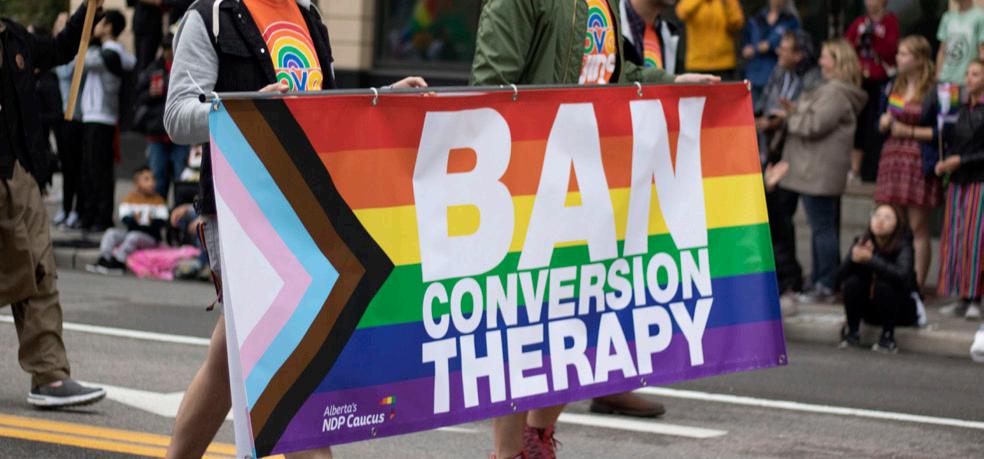
* Historical tidbits were generated with information from Kevin Allen, research lead at the Calgary Gay History Project. Kevin’s book, Our Past Matters: Stories of Gay Calgary, is an amazing resource – order it at your local independent bookstore!
Small-Town Pride
Reflections on what impact Pride movements in small communities like Yorkton, Sask., have for folks who have never been able to be out in their communities
By Jenn Tatton
Imagine being a young queer kid walking down a street in your hometown, kicking a pebble with your shoe. Then you look up, and what do you see? A rainbow flag rising up a flagpole, a magnificent reminder that you do indeed exist.
That’s not my story. I grew up in a much less accepting time, when rainbow flags were things you saw on TV and your parents told you to quit asking questions if you asked them about it.
Yorkton had its first Pride flag raising in 2016. I remember it well, although I wasn’t there. I was still hiding in a closet somewhere, trying to be an ally where I could, because being out in my community was too frightening a thought. The following year, Yorkton had a Pride march. I remember that too, even though I wasn’t there. There were several advertised events that I didn’t go to. I vividly remember driving by them, each time willing myself to go inside, just to see. I wondered, was that the reality for anyone else? Was anybody else even in there?
Marching in my first Pride parade in 2017, in my hometown, was the most amazing thing I have ever experienced. After that, I never looked back. I had to do this, I had to get involved. At that time, we were supported by Moose Jaw Pride and the Saskatchewan Pride network and by the almost single-handed efforts of Laura Budd, our liaison in the area. Calling her a liaison feels unfair. She is an advocate, a champion, and an all-around amazing woman without whom Yorkton might never have had a Pride movement at all.
We began as a fledgling movement, fumbling around and trying to get a toehold in the community. Well, we must have done something right because we went from having just a handful of folks at those first Pride events to having a couple of hundred show up over a week’s worth of events at our most recent Pride week.
Of course, we had backlash. On social media, people complained about the rainbow crosswalk that our LGBTQ+ youth had painted. But when the bullies come out, so do the allies. We found out that we had more allies than we realized – we had people in our corner.
By 2019, we had grown so much that we decided it was time for us to strike out on our own. With the support of Moose Jaw Pride and the Saskatchewan Pride Network, we were able to incorporate and create a Pride board. I now proudly sit on that board as its secretary, and I think back to that few short years ago, sitting in my car and deciding whether to stay or to go. That all seems so long ago.
I’m glad I was able to be a part of this movement alongside two amazing women: Margo Allaire, our board chair, and Laura Budd, our treasurer. We now have regular board meetings and social media pages, events throughout the year such as game nights and movie nights, and events like bubble ball soccer. We have the privilege of being able to serve our LGBTQ+ community in ways that foster connection and help people feel less alone.
In March 2020, we made the difficult decision to postpone our Pride events indefinitely. It was a blow, considering the momentum we had gained. But what is it they say about the best-laid plans? So now we face a new reality: finding ways to support our queer community amid social distancing and fears of COVID-19. But, as queer folks, we all know what it’s like to have to wait until it’s safe to come out. We know we can handle this, and we aren’t going anywhere.
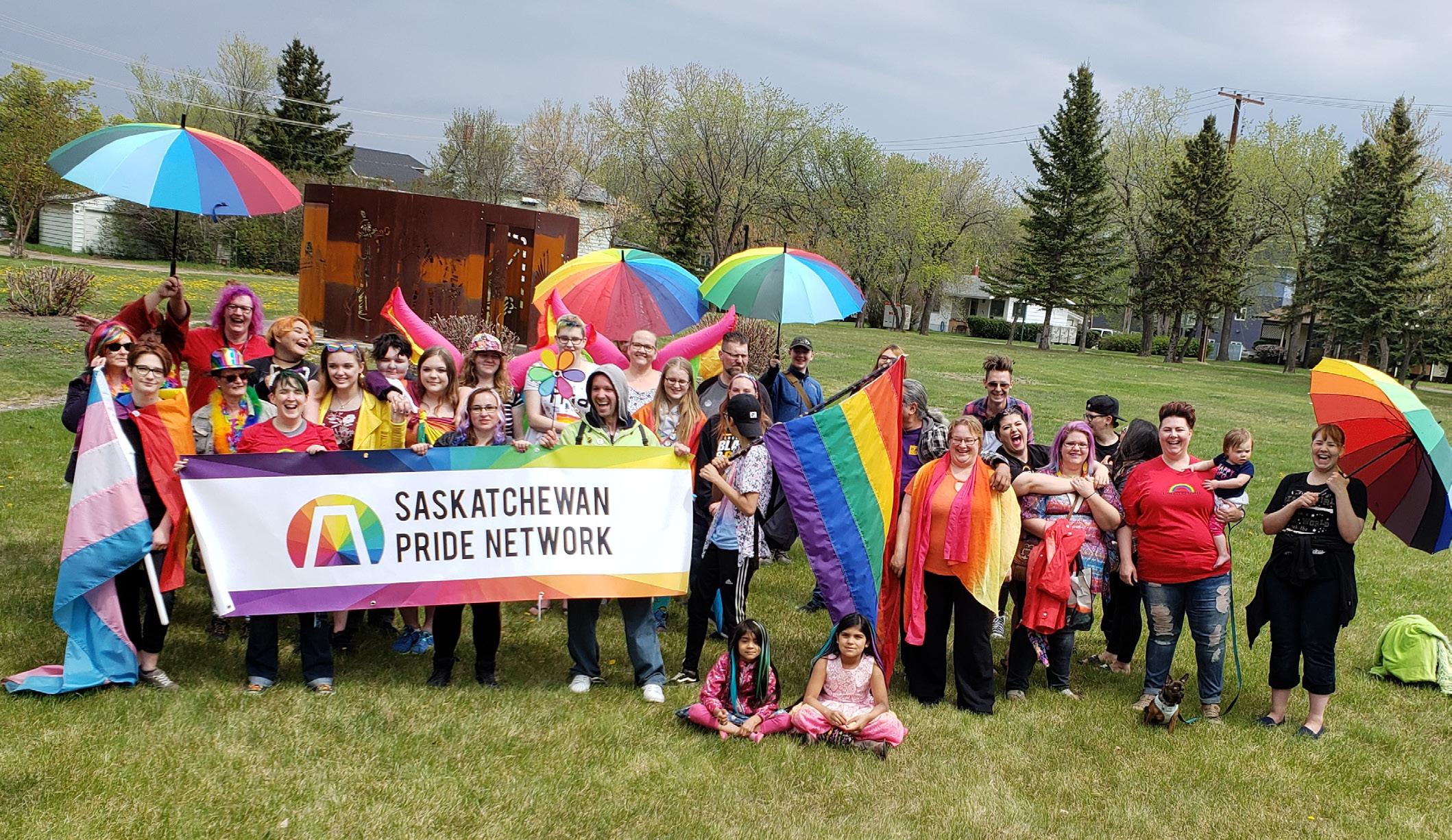
On The Pow Wow Trail With Pride
The integration of a Two-Spirit pow wow into a Pride event is a powerful demonstration of decolonization and reconciliation
By Albert McLeod
Up until the last couple of decades, Indigenous LGBTQ/Two-Spirit people existed at the fringes of mainstream LGBTQ consciousness. While Indigenous and other queer people of colour were leaders in the LGBTQ liberation movement, their contributions were rarely noted. However, the introduction of the term “Two-Spirit” in 1990 increased the understanding of Indigenous LGBTQ people living in the pre-colonial history of the Americas, and established a niche in the LGBTQ and Indigenous sectors in the modern era.
In 1975, Two-Spirit organizing was led by Randy Burns and Deborah Cameron when they established the Gay American Indians group in San Francisco. When the HIV pandemic reached American cities in 1980s, it galvanized Two-Spirit people in Canada and the US to mount a response. The Two-Spirit liberation movement began in earnest with the first International Two-Spirit Gathering, held in Minneapolis in 1988. This gathering, which continues annually today, is the cornerstone of Two-Spirit cultural reclamation and cross-border collaborations and support.
Pride Winnipeg has hosted the annual Pride March since 1987, when the inaugural march was held to celebrate the passing of Manitoba legislation that prohibited discrimination based on sexual orientation. In recent years, there were criticisms that Winnipeg’s Pride was tailored to a white cis-male audience, and that Indigenous and Queer and Trans People of Colour (QTPOC) were not fairly represented in its marketing or events.
In July 2016, Pride Winnipeg hosted a community consultation to develop a five-year plan in order to diversify their representation and inclusion of LGBTQ people in Winnipeg. Afterwards, they began a campaign that represented Two-Spirit and QPOC people in their online promotion of the festival weekend and in their Pride Week events. That year, Gayle Pruden, a First Nation transgender activist, was selected as the Pride March Grand Marshal. Successive Grand Marshalls have also been Indigenous leaders: Kelly Houle (2017), Brielle Beardy Linklater (2018) and Peetanacoot Nenakwekapo (2019).
For Two-Spirit people, an underlying need was to have Pride represent them culturally and have events that held meaning for them. The following year, Pride Winnipeg collaborated with the Like That program at Sunshine House and the Two-Spirited People of Manitoba organization to host a Two-Spirit pow wow during Pride Week.
The term “pow wow” derives from Pau Wau, meaning “medicine man” in Narrtick, a language spoken by the Algonquian peoples in Massachusetts. English settlers began misusing the word to refer to the meetings of Indigenous medicine men, and later to any kind of American Indian gathering. American Indians have since reclaimed the term.
The first alcohol- and drug-free Two-Spirit pow wow was held on May 26, 2017 at The Forks National Historic Site, next to the Pride Winnipeg main stage and festival grounds. Since then, Two-Spirit pow wows have become a part of Pride Winnipeg’s annual celebration. At the 2019 pow wow, 10 drum groups and more than 100 dancers participated, and approximately 1,000 Pride participants visited the event.
Due to the COVID-19 pandemic, this year’s Pride celebrations, including the pow wow, have been postponed until September 4-13, 2020 and will be held in a digital format.
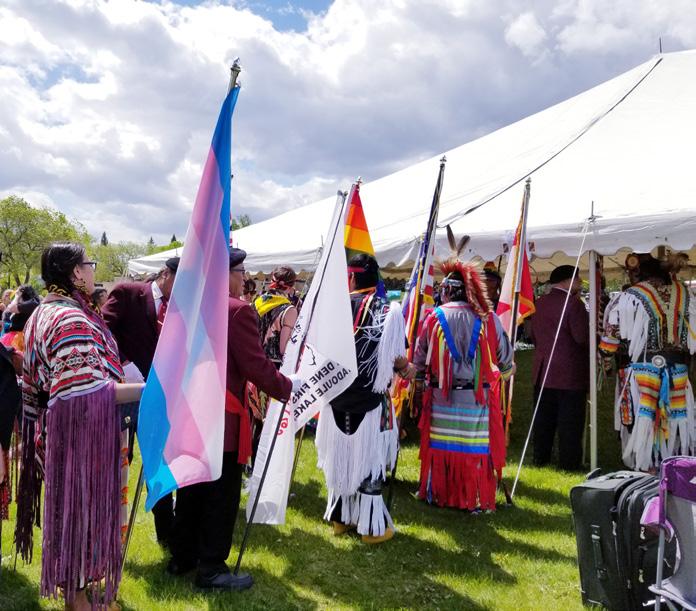
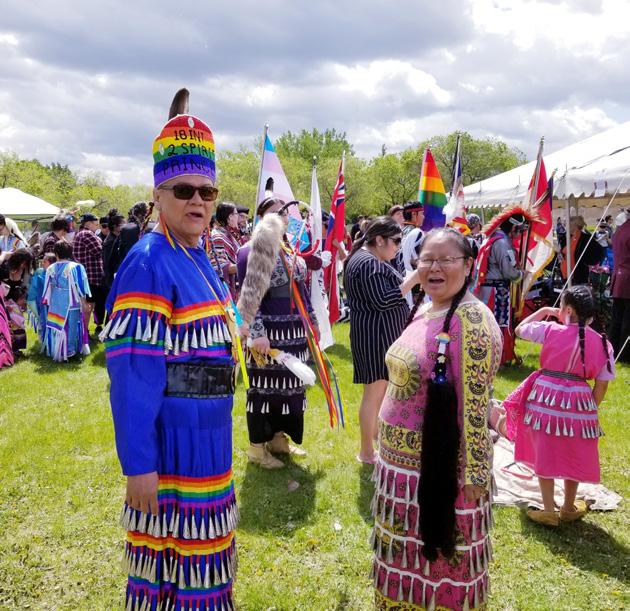
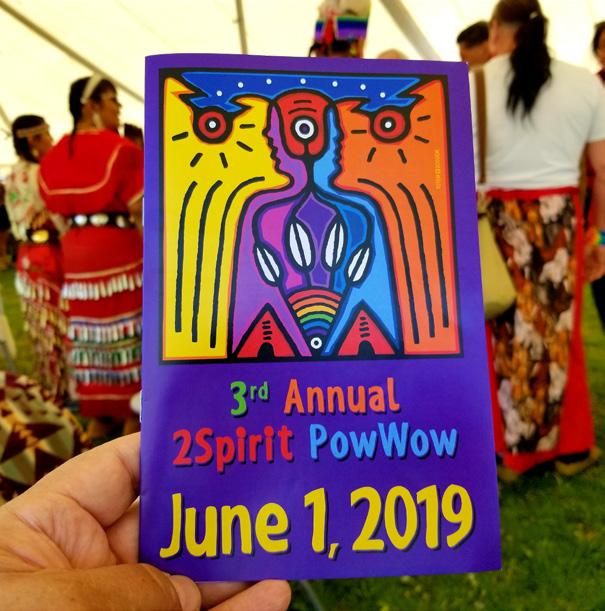
ALBERT MCLEOD is a Status Indian with ancestry from Nisichawayasihk Cree Nation and the Metis community of Norway House in northern Manitoba. He has over 30 years of experience as a human rights activist and is one of the directors of the Two-Spirited People of Manitoba. Albert began his Two-Spirit advocacy in Winnipeg in 1986 and became an HIV/AIDS activist in 1987. He was the director of the Manitoba Aboriginal AIDS Task Force from 1991 to 2001. In 2018, Albert received an Honorary Doctorate of Laws from the University of Winnipeg. Albert lives in Winnipeg, where he works as a consultant specializing in Indigenous peoples cultural reclamation, and cross-cultural training. www.albertmcleod.com
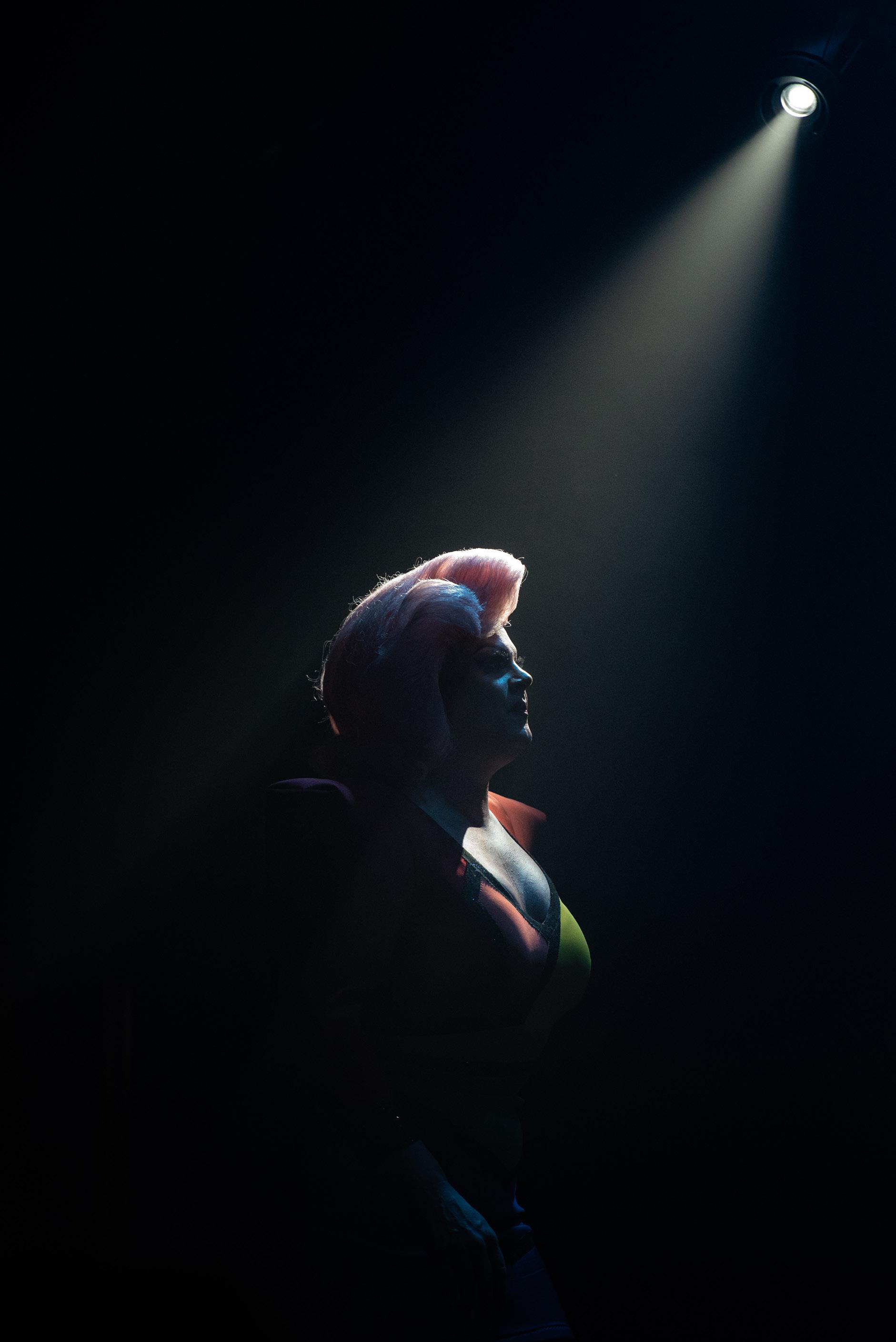
Nina West, Drag Up Your Pride!, June 13th, 2019. (Photo by Wade Muir / www.wademuir.ca)
Irmana “Eden Disney” Se, TKBA CHOPPEDXtra, June 27, 2019. (Photo by Wade Muir / www.wademuir.ca)
